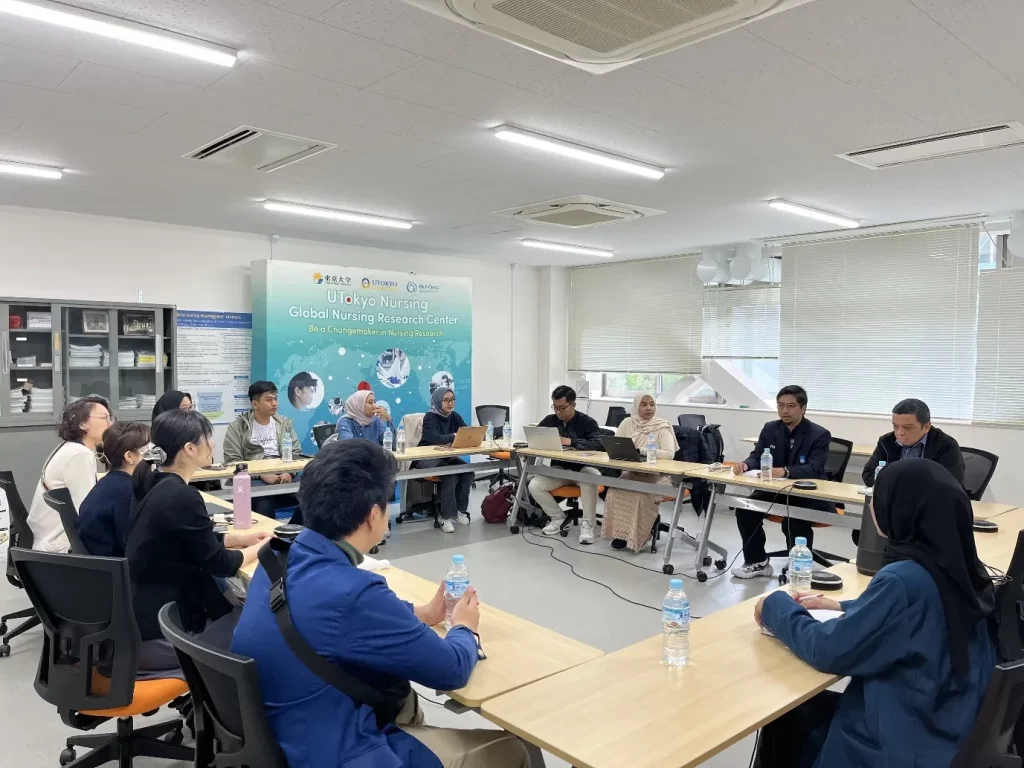UNAIR NEWS – In a strategic effort to strengthen international academic and research networks, the Indonesian delegation participating in the Sakura Science Program (SSP) held a strategic meeting at the University of Tokyo, Japan. This gathering serves as a vital step in fostering cross-border collaboration, particularly in technology transfer, knowledge sharing, and human resource development.
The SSP delegation from Indonesia included representatives from Universitas Airlangga (UNAIR) and Sepuluh Nopember Institute of Technology (ITS). UNAIR was represented by Nauvila Fitrotul Aini, Aziz Nashiruddin Habibie, Nur Arifah Astri, and Ninik Dwi Rahayu, while ITS delegates included Hadziq Fabroyir, Gerry Sihaj, Muhammad Rafi Fillah, and Widian Sasi Disertasiani. The meeting also welcomed Dianis Wulan Sari and Neisya Pratiwindya Sudarsiwi from the Dementia and Aging Research Center (DACRC), Education Attaché of the Indonesian Embassy in Japan, Professor Amzul Rifin, and key representatives from the University of Tokyo, including Professor Noriko Yamamoto-Mitani.
In his address, Professor Amzul Rifin emphasized the Indonesian government’s commitment, through the Indonesian Embassy in Tokyo, to bolstering research and technology collaboration across nations. “International research collaboration is a crucial element in addressing increasingly complex global challenges. We, at the Indonesian Embassy, fully support this endeavor, particularly in accelerating technology transfer and fostering research that delivers tangible benefits to society,” he stated.
Professor Noriko Yamamoto-Mitani of the University of Tokyo expressed her admiration for the efforts of the Indonesian delegation, emphasizing the importance of global research partnerships. “We believe that international partnerships, especially in health and technology research, can yield significant contributions by creating innovative and impactful solutions,” she remarked.
Focus on technology and knowledge transfer
The discussion highlighted the importance of technology and knowledge transfer as the core of collaboration. Delegates from SSP and the University of Tokyo explored various partnership opportunities, including joint research projects, expert exchanges, and capacity-building initiatives through training and scholarships.
The Sakura Science Program, initiated by the Japan Science and Technology Agency (JST), aims to strengthen inter-country relations through the advancement of science and technology. This program has proven to be an effective platform for connecting academics, researchers, and students from diverse nations to collaborate on innovative projects.
The Indonesian delegation expressed high hopes for the program’s potential to deepen ties between Indonesian universities and Japan’s leading academic institutions. “We see tremendous potential in this collaboration, not just for academic purposes but also for delivering tangible impacts to broader society, particularly in health and technology,” said Hadziq Fabroyir, a delegation member.
Government support and future prospects
The partnership between the Indonesian Embassy in Tokyo, the University of Tokyo, and the SSP delegation is anticipated to pave the way for similar initiatives in the future. Support from the Indonesian government, facilitated through the embassy, plays a crucial role in expediting the implementation of such partnerships, including providing access to funding, regulatory frameworks, and international networks.
“We are optimistic that this initiative will serve as a stepping stone toward enhancing Indonesia’s research competitiveness on the global stage. We also hope that the outcomes of this collaboration will contribute significantly to the advancement of science and technology in both nations,” added Professor Amzul Rifin.
Research as global solution
The meeting also addressed pressing global challenges that demand cross-disciplinary and international collaboration. Health research was highlighted as a key priority, considering global challenges such as pandemics and climate change.
As one of the world’s leading educational institutions, the University of Tokyo reaffirmed its commitment to expanding opportunities for Indonesian academics and researchers. “We hope this collaboration will serve as an example of how international research can drive innovative solutions with widespread benefits,” stated Professor Yamamoto-Mitani.
The meeting concluded with a shared commitment to sustain discussions and outline actionable steps to advance the collaborative research initiatives. The Sakura Science Program aspires to act as a bridge for impactful global innovations and to reinforce the strong ties between Indonesia and Japan.
Author: Aziz Nashiruddin Habibie
Editor: Yulia Rohmawati









